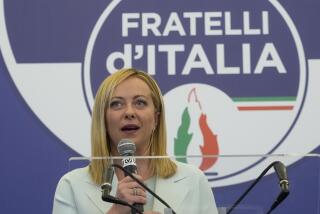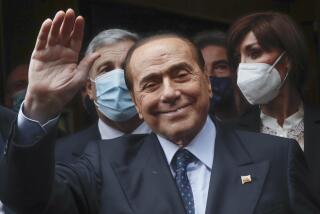Italy Targets Ex-Premier in Mafia Inquiry
- Share via
ROME — Seven-time Prime Minister Giulio Andreotti, the personification of the now-discredited political Establishment that has ruled Italy since World War II, is being formally investigated for suspected Mafia activity. Andreotti himself made the disclosure Saturday in a statement proclaiming his innocence.
Reports that magistrates in Sicily had linked the 74-year-old Andreotti to their investigation of organized crime had circulated in hushed tones in Rome since midweek.
Still, when the confirmation came in the dusk of a blustery Saturday, it rolled like thunder over the country. Now senator-for-life, Andreotti is one of Europe’s senior statesmen and has been a familiar and central pillar of Italian public life for nearly half a century.
Details of the accusations against Andreotti, whose last administration ended after general elections in April, 1992, were not available Saturday night. Italian state television reported that a 200-page file had been forwarded to the Senate by investigating magistrates in Palermo who are asking that his parliamentary immunity from prosecution be lifted.
“The news that I am under investigation deeply distresses me,” Andreotti said in a statement disclosing that he is the formal target of a judicial Mafia inquiry. Andreotti said he is “embittered” by accusations he called “slanderous.”
Noting that his last government had sponsored tough anti-Mafia laws that have been fundamental to recent police blows against organized crime, Andreotti accused Mafia informers of “a vendetta” against him. “Better this way than with a shotgun,” he said.
“To accuse me of Mafia activity is paradoxical. As a government and also in person I have adopted tough measures against the Mafiosi and proposed the most severe and effective laws. . . . I fear no serious investigation,” Andreotti said.
Andreotti is the latest prominent victim of two spectacular national investigations that are gradually merging to reveal the greatest web of scandal in the history of democratic Italy.
For the past year, investigations that began in Milan have uncovered a huge network of payoffs, kickbacks and bribes involving business leaders and public officials. More than 1,000 prominent people, including Cabinet ministers and party leaders, have been caught up in investigations documenting systematic payoffs to politicians for public works contracts.
At the same time, police and investigating magistrates in Sicily and southern Italy wielding Draconian new anti-Mafia laws have been recording an impressive string of victories against organized crime. Now, in the south, where Andreotti’s Christian Democrats are the dominant party, the two investigations are flowing together.
On Saturday, magistrates in Naples acted with a force that one nonplussed commentator compared to an eruption of Mt. Vesuvius, the volcano that looms over a city nationally renowned for its crime and corruption.
They jailed more than a dozen of the city’s elite, including a former mayor, as part of corruption inquiries that, Italian reporters say, link politicians, business leaders and local organized crime. Senior anti-Mafia prosecutor Bruno Siclari met Saturday in Naples with magistrates investigating political payoffs.
In addition, the Neapolitan investigators on Saturday formally warned 26 people, including national and European parliamentarians, that they are under investigation. Among them was Vincenzo Scotti, an interior minister under Andreotti and a leading member of Parliament’s anti-Mafia commission.
Recent anti-Mafia successes have been possible in large measure because of information given by nearly 300 Mafia turncoats taking advantage of promised leniency and a new, U.S.-style witness-protection program.
At least three of the most important informers are said by Italian sources to have named Salvo Lima, a senior Christian Democratic Party figure in Sicily, as the link man between the Mafia and ruling politicians.
Lima, a close friend and political ally of Andreotti, was murdered a year ago in Palermo. Informers said later that his murder was a response to his weakening power to effectively mediate politically on the Mafia’s behalf.
One informer told magistrates that Mafia boss of bosses Salvatore Riina, who was arrested in January, was furious at organized crime’s increasing inability to influence the outcome of Mafia trials.
According to Italian newspapers, Andreotti, who has sturdily stood by Lima’s memory, has himself been named by at least three recent Mafia turncoats as one of the figures with whom Lima dealt on mob business.
Following Andreotti’s dramatic disclosure Saturday, there was immediate speculation in Palermo and Rome--without confirmation--that new details linking politicians and the Mafia had been provided to investigators by former Palermo Mayor Vito Ciancimino. Also in jail for Mafia activities, Ciancimino has recently begun answering some of the questions asked him by Palermo magistrates.
Andreotti’s righteous denial will place great pressure on the Palermo judges to promptly prove their case. Often accused by political opponents over the years of underhanded activities, Andreotti has cannily survived nearly a score of parliamentary investigations.
In many ways, Andreotti is a living symbol of the Italy that emerged from the ruins of World War II to become one of the world’s seven largest industrial powers.
The Christian Democrats have dominated every government since the fall of fascism and the creation of the Italian republic following the war. The bespectacled Andreotti has dwelt near the heart of all of them.
A polished writer and a consummate professional politician noted for his irony and wit, Andreotti has been a national political figure since the war ended in 1945. He became an undersecretary in 1947 and a junior minister as long ago as 1949.
A Roman born and bred, Andreotti first became prime minister in 1972--for nine days in February. In addition to six other terms as head of the government, Andreotti has also been minister of defense eight times, foreign minister five times, twice finance minister, twice budget minister, twice minister of industry. He was treasury minister once and interior minister once--the latter for 12 days in 1954.
In the Italian political firmament, it was widely expected that Andreotti would climax his career by becoming president of the republic last year, replacing outgoing President Francesco Cossiga.
National elections in April, though, dealt a mighty blow to the Christian Democrats and their coalition allies in the first major expression of a sweeping nationwide revolt against party power-mongering. Instead of moving to the Quirinale Palace, Andreotti went to the Senate as a life member, and into semi-retirement.
The payoff investigations were under way at election time, and it was already clear that Establishment parties were in the eye of the storm. By now, a year later, scandal has spread to almost every major city, deepening public disgust. A national referendum April 18 will probably force a new political system, renewed parties and a new general election.
More to Read
Sign up for Essential California
The most important California stories and recommendations in your inbox every morning.
You may occasionally receive promotional content from the Los Angeles Times.













